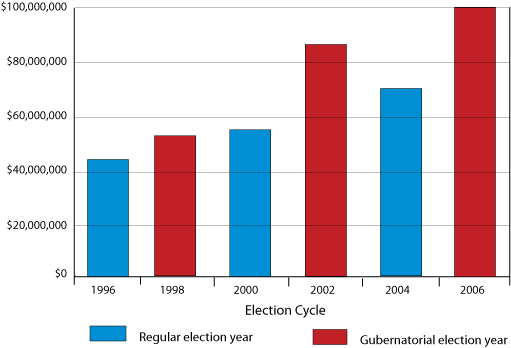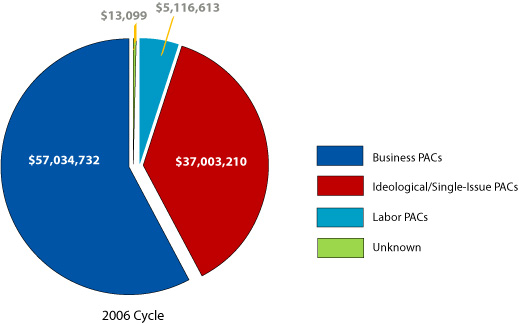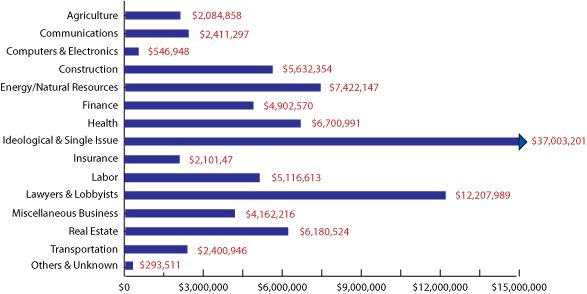
Austin—Fueled by an election headlined by four well-funded gubernatorial candidates, an unprecedented 1,132 Texas political action committees (PACs) spent a record $99 million on the state’s 2006 elections. This spending marked a 16 percent increase over the preceding gubernatorial election in 2002.
Business PACs accounted for $57 million of the total, up 24 percent from what they spent in the previous cycle. Spending by Ideological and Single-Issue PACs more than doubled, however, to $37 million. As a result, these PACs accounted for 37 percent of all state PAC spending in 2006--up from 26 percent in 2004.
Driving the resurgence of Ideological PACs were major spending increases by PACs affiliated with the two dominant parties—as well as the emergence of major new PACs aligned with these parties. The largest new PACs (that were not active in 2004) include the Texas Republican Legislative Campaign Committee ($2.7 million) and the Texas Democratic Trust ($2.3 million). These huge new PACs emerged as Texas’ second and sixth largest PACs, respectively. Local party PAC spending spiked in Houston and the Metroplex, which emerged as major partisan battlegrounds as a result of demographic shifts favoring Democrats.
“Without campaign-contribution limits, political representation in Texas is influenced at least as much by massive expenditures of special-interest money as it is by demographic changes at the democratic grassroots,” said Texans for Public Justice Director Craig McDonald. “To understand how big business controls the legislature, follow the money.”
Apart from the Ideological sector, Miscellaneous Business PACs posted the biggest gain in spending (increasing 71 percent from 2004 to 2006). The alcohol industry lubricated this growth going into the 2007 legislative session, when liquor wholesalers, retailers and bars fought a stalemated battle to gain new regulatory advantages over their respective liquor sales.
The new report, Texas PACs: 2006 Cycle Spending, ranks the 100 biggest PACs in Texas and classifies PACs by their economic and ideological interests. Major findings include:
- Texans for Lawsuit Reform retained its title as Texas’ most powerful PAC by spending $4.2 million. The Texas Association of Realtors ranked No. 2 at $3.3 million.
- Texas’ 46 largest PACs—which spent more than $400,000 apiece—accounted for half of the $99 million total spent by 1,132 active PACs.
- Ideological and Single-Issue PACs accounted for 37 percent of all PAC spending, followed by Lawyers & Lobbyists (12 percent); Energy & Natural Resources (8 percent); Health (7 percent) and Real Estate (6 percent).
- A constitutional amendment to ban gay marriages accounted for most of the $1.1 million spent by so-called “specific-purpose PACs.” The amendment passed handily despite the fact that opponents of the measure outspent supporters almost 2:1.
In analyzing PAC trends, the new report identifies:
- The top new PACs (led by the Republican Legislative Campaign Committee);
- The fastest-growing PACs (led by Mirant Corp.);
- The fastest-shrinking PACs (led by Texans for a Republican Majority); and
- The largest vanishing PACs (including the late-great Enron Corp PAC).
Texas’ Rising PAC Spending
Spikes In Gubernatorial Election Years

2006 Texas PAC Expenditures
By Major-Interest Categories

2006 Texas PAC Expenditures
By Detailed-Interest Categories

Texas PACs was prepared by Omair Khan, Nhu Truong and Andrew Wheat. The report, based on PAC disclosure reports filed with the Texas Ethics Commission, is available at http://www.tpj.org.
Texans for Public Justice is a non-partisan, non-profit policy & research
organization that tracks money in Texas politics.
###